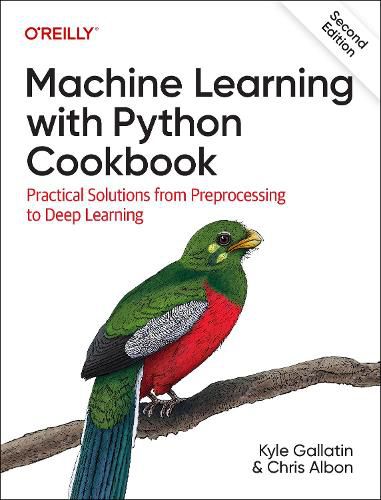Readings Newsletter
Become a Readings Member to make your shopping experience even easier.
Sign in or sign up for free!
You’re not far away from qualifying for FREE standard shipping within Australia
You’ve qualified for FREE standard shipping within Australia
The cart is loading…






This practical guide provides more than 200 self-contained recipes to help you solve machine learning challenges you may encounter in your work. If you're comfortable with Python and its libraries, including pandas and scikit-learn, you'll be able to address specific problems, from loading data to training models and leveraging neural networks.
Each recipe in this updated edition includes code that you can copy, paste, and run with a toy dataset to ensure that it works. From there, you can adapt these recipes according to your use case or application. Recipes include a discussion that explains the solution and provides meaningful context.
Go beyond theory and concepts by learning the nuts and bolts you need to construct working machine learning applications. You'll find recipes for:
Vectors, matrices, and arrays Working with data from CSV, JSON, SQL, databases, cloud storage, and other sources Handling numerical and categorical data, text, images, and dates and times Dimensionality reduction using feature extraction or feature selection Model evaluation and selection Linear and logical regression, trees and forests, and k-nearest neighbors Supporting vector machines (SVM), naaeve Bayes, clustering, and tree-based models Saving, loading, and serving trained models from multiple frameworks
About the Author
Kyle Gallatin is a software engineer for machine learning infrastructure with years of experience as a data analyst, data scientist and machine learning engineer. He is also a professional data science mentor, volunteer computer science teacher and frequently publishes articles at the intersection of software engineering and machine learning. Currently, Kyle is a software engineer on the machine learning platform team at Etsy. Chris Albon is the Director of Machine Learning at the Wikimedia Foundation, the non-profit that hosts Wikipedia.
$9.00 standard shipping within Australia
FREE standard shipping within Australia for orders over $100.00
Express & International shipping calculated at checkout
This practical guide provides more than 200 self-contained recipes to help you solve machine learning challenges you may encounter in your work. If you're comfortable with Python and its libraries, including pandas and scikit-learn, you'll be able to address specific problems, from loading data to training models and leveraging neural networks.
Each recipe in this updated edition includes code that you can copy, paste, and run with a toy dataset to ensure that it works. From there, you can adapt these recipes according to your use case or application. Recipes include a discussion that explains the solution and provides meaningful context.
Go beyond theory and concepts by learning the nuts and bolts you need to construct working machine learning applications. You'll find recipes for:
Vectors, matrices, and arrays Working with data from CSV, JSON, SQL, databases, cloud storage, and other sources Handling numerical and categorical data, text, images, and dates and times Dimensionality reduction using feature extraction or feature selection Model evaluation and selection Linear and logical regression, trees and forests, and k-nearest neighbors Supporting vector machines (SVM), naaeve Bayes, clustering, and tree-based models Saving, loading, and serving trained models from multiple frameworks
About the Author
Kyle Gallatin is a software engineer for machine learning infrastructure with years of experience as a data analyst, data scientist and machine learning engineer. He is also a professional data science mentor, volunteer computer science teacher and frequently publishes articles at the intersection of software engineering and machine learning. Currently, Kyle is a software engineer on the machine learning platform team at Etsy. Chris Albon is the Director of Machine Learning at the Wikimedia Foundation, the non-profit that hosts Wikipedia.